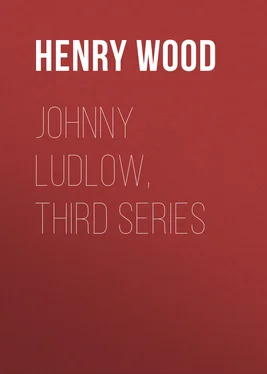Henry Wood - Johnny Ludlow, Third Series
Здесь есть возможность читать онлайн «Henry Wood - Johnny Ludlow, Third Series» — ознакомительный отрывок электронной книги совершенно бесплатно, а после прочтения отрывка купить полную версию. В некоторых случаях можно слушать аудио, скачать через торрент в формате fb2 и присутствует краткое содержание. Жанр: foreign_prose, literature_19, foreign_antique, на английском языке. Описание произведения, (предисловие) а так же отзывы посетителей доступны на портале библиотеки ЛибКат.
- Название:Johnny Ludlow, Third Series
- Автор:
- Жанр:
- Год:неизвестен
- ISBN:нет данных
- Рейтинг книги:4 / 5. Голосов: 1
-
Избранное:Добавить в избранное
- Отзывы:
-
Ваша оценка:
- 80
- 1
- 2
- 3
- 4
- 5
Johnny Ludlow, Third Series: краткое содержание, описание и аннотация
Предлагаем к чтению аннотацию, описание, краткое содержание или предисловие (зависит от того, что написал сам автор книги «Johnny Ludlow, Third Series»). Если вы не нашли необходимую информацию о книге — напишите в комментариях, мы постараемся отыскать её.
Johnny Ludlow, Third Series — читать онлайн ознакомительный отрывок
Ниже представлен текст книги, разбитый по страницам. Система сохранения места последней прочитанной страницы, позволяет с удобством читать онлайн бесплатно книгу «Johnny Ludlow, Third Series», без необходимости каждый раз заново искать на чём Вы остановились. Поставьте закладку, и сможете в любой момент перейти на страницу, на которой закончили чтение.
Интервал:
Закладка:
We were staying at Crabb Cot. I had gone to bed at half-past nine, dead tired after a day’s fishing. The Squire and Tod were away: Mrs. Todhetley went over to the Coneys’ after tea, and did not seem in a hurry to come back. They fried one of the fish I had caught for my supper; and after that, there being no one to speak to, I went to bed.
It was a knocking that had wakened me out of my sleep: I was sure of that. And it sounded exactly as though it were at the window—which was very improbable. Calling out again to know who was there, and what was wanted—though not very loudly, for the children slept within earshot—and getting no answer, I lay down again, and was all but asleep when the noise came a second time.
It was at the dining-room window, right underneath mine. There could be no mistake about it. The ceilings of the old-fashioned house were low; the windows were very near each other, and mine was down at the top. I thought it time to jump out of bed, and take a look out.
Well, I was surprised! Instead of its being the middle of the night, it must be quite early still; for the lamp was yet alight in the dining-room. It was a cosy kind of room, with a bow window jutting on to the garden, of which the middle compartment opened to the ground, as French windows do. My window was a bow also, and close above the other. Throwing it up, I looked out.
There was not a soul to be seen. Yet the knocking could not have been from within, for the inside shutters were closed: they did not reach to the top panes, and the lamplight shone through them on the mulberry tree. As I leaned out, wondering, the crazy old clock at North Crabb Church began to tell the hour. I counted the strokes, one by one—ten of them. Only ten o’clock! And I thought I had been asleep half the night.
All in a moment I caught sight of some one moving slowly away. He was keeping in the shade; close to the shrubs that encircled the lawn, as if not caring to be seen. A short, thin man, in dark clothes and round black felt hat. Who he was, and what he wanted, was more than I could imagine. It could not be a robber. Robbers don’t come knocking at houses before people have gone to bed.
The small side-gate opened, and Mrs. Todhetley came in. Old Coney’s farm was only a stone’s-throw off, and she had run home alone. We people in the country think nothing of being abroad alone at night. The man emerged from the shade, and placed himself right in her path, on the gravel walk. They stood there together. I could see him better now: there was no moon, but the night was light; and it flashed into my mind that he was the same man I had seen Mrs. Todhetley with in the morning, as I went across the fields, with my rod and line. She was at the stile, about to descend into the Ravine, when he came up from it, and accosted her. He was a stranger; wearing a seedy, shabby black coat; and I had wondered what he wanted. They were still talking together when I got out of sight, for I turned to look.
Not long did they stand now. The gentleman went away; she came hastening on with her head down, a soft wool kerchief thrown over her cap. In all North Crabb, no one was so fearful of catching face-ache as Mrs. Todhetley.
“Who was it?” I called out, when she was under the window: which seemed to startle her considerably, for she gave a spring back, right on to the grass.
“Johnny! how you frightened me! What are you looking out at?”
“At that fellow who has just taken himself off. Who is he?”
“I do believe you have on nothing but your nightshirt! You’ll be sure to take cold. Shut the window down, and get into bed.”
Four times over, in all, had I to ask about the man before I got an answer. Now it was the nightshirt, now catching cold, now the open window and the damp air. She always wanted to be as tender with us as though we were chickens.
“The man that met me in the path?” she got to, at length. “He made some excuse for being here: was not sure whose house it was, I think he said: had turned in by mistake to the wrong one.”
“That’s all very fine; but, not being sure, he ought to mind his manners. He came rapping at the dining-room window like anything, and it woke me up. Had you been at home, sitting there, good mother, you might have been startled out of your seven senses.”
“So I should, Johnny. The Coneys would not let me come away: they had friends with them. Good-night, dear. Shut down that window.”
She went on to the side-door. I put down the window, opened it at the top, and let the white curtain drop before it. It was an hour or two before I got to sleep again, and I had the man and the knocking in my thoughts all the time.
“Don’t say anything about it in the house, Johnny,” Mrs. Todhetley said to me, in the morning. “It might alarm the children.” So I promised her I would not.
Tod came home at mid-day, not the Squire: and the first thing I did was to tell him. I wouldn’t have broken faith with the mother for the world; not even for Tod; but it never entered my mind that she wished me to keep it a close secret, excepting from those, servants or others, who might be likely to repeat it before Hugh and Lena. I cautioned Tod.
“Confound his impudence!” cried Tod. “Could he not be satisfied with disturbing the house at the door at night, but he must make for the window? I wish I had been at home.”
Crabb Ravine lay to the side of our house, beyond the wide field. It was a regular wilderness. The sharp descent began in that three-cornered grove, of which you’ve heard before, for it was where Daniel Ferrar hanged himself; and the wild, deep, mossy dell, about as wide as an ordinary road, went running along below, soft, green and damp. Towering banks, sloping backwards, rose on either side; a mass of verdure in summer; of briars, brown and tangled, in winter. Dwarf shrubs, tall trees, blackberry and nut bushes, sweet-briar and broom clustered there in wild profusion. Primroses and violets peeped up when spring came in; blue bells and cowslips, dog-roses, woodbine, and other sweet flowers, came later. Few people would descend except by the stile opposite our house and the proper zigzag path leading down the side bank, for a fall might have broken limbs, besides bringing one’s clothes to grief. No houses stood near it, except ours and old Coney’s; and the field bordering it just here on this side belonged to Squire Todhetley. If you went down the zigzag path, turned to the right, walked along the Ravine some way, and then up another zigzag on the opposite side, you soon came to Timberdale, a small place in itself, but our nearest post-town. The high-road to Timberdale, winding past our house from South Crabb, was twice the distance, so that people might sometimes be seen in the Ravine by day; but no one cared to go near it in the evening, as it had the reputation of being haunted. A mysterious light might sometimes be observed there at night, dodging about the banks, where it would be rather difficult for ordinary human beings to walk: some said it was a will-o’-the-wisp, and some said a ghost. It was difficult to get even a farm-servant to go the near way to Timberdale after dark.
One morning, when I was running through the Ravine with Tod in search of Tom Coney, we came slap against a man, who seemed to be sneaking there, for he turned short off, into the underwood, to hide himself. I knew him by his hat.
“Tod, that’s the man,” I whispered.
“What man, Johnny?”
“The one who came knocking at the window three nights ago.”
“Oh!” said Tod, carelessly. “He looks like a fellow who comes out with begging petitions.”
It might have been an hour after that. We had come up from the Ravine, on our side of it, not having seen or spoken to a soul, except Luke Mackintosh. Tod told me to stay and waylay Coney if he made his appearance, whilst he went again to the farm in search of him. Accordingly, I was sitting on the fence (put there to hinder the cattle and sheep from getting over the brink of the Ravine), throwing stones and whistling, when I saw Mrs. Todhetley cross the stile to go down the zigzag. She did not see me: the fence could hardly be gained for trees, and I was hidden.
Читать дальшеИнтервал:
Закладка:
Похожие книги на «Johnny Ludlow, Third Series»
Представляем Вашему вниманию похожие книги на «Johnny Ludlow, Third Series» списком для выбора. Мы отобрали схожую по названию и смыслу литературу в надежде предоставить читателям больше вариантов отыскать новые, интересные, ещё непрочитанные произведения.
Обсуждение, отзывы о книге «Johnny Ludlow, Third Series» и просто собственные мнения читателей. Оставьте ваши комментарии, напишите, что Вы думаете о произведении, его смысле или главных героях. Укажите что конкретно понравилось, а что нет, и почему Вы так считаете.












